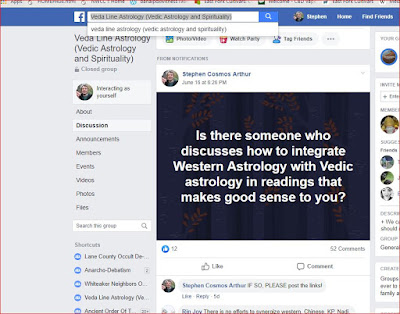Q & A from Veda Line Astrology (Vedic Astrology and Spirituality)
- Get link
- X
- Other Apps
https://firdaria.com/
- Rose Brcway Rose Petters, Classical Western Astrology does have a predictive system based on planetary cycles and it’s called Firdaria. Also, there’s another predictive technique that can be used combined to it in order to identify the house and planet that are highlighted each year; this technique is called Annual Profections. Obviously, there are differences in the way we determine the sequence of those planetary cycles in the Dasha system of Vedic and the Firdaria system of Western Astro: in Vedic, the Moon placement by sign is what determines one’s first Mahadasha (the planet that rules the Nakshatra of one’s Moon controls the first Mahadasha and a predetermined Dasha sequence follows through); in Western Astro, the Sun’s placement in reference to the horizon defines the sequence, so if the Sun is above the horizon (meaning that one was born during the day), the Sun controls the first planetary cycle but if the Sun is below the horizon (meaning that one was born at night), the Moon controls the first cycle and for both cases a predetermined sequence follows through.
- Rose Brcway Rose Petters, Classical Western Astrology does have a predictive system based on planetary cycles and it’s called Firdaria. Also, there’s another predictive technique that can be used combined to it in order to identify the house and planet that are highlighted each year; this technique is called Annual Profections. Obviously, there are differences in the way we determine the sequence of those planetary cycles in the Dasha system of Vedic and the Firdaria system of Western Astro: in Vedic, the Moon placement by sign is what determines one’s first Mahadasha (the planet that rules the Nakshatra of one’s Moon controls the first Mahadasha and a predetermined Dasha sequence follows through); in Western Astro, the Sun’s placement in reference to the horizon defines the sequence, so if the Sun is above the horizon (meaning that one was born during the day), the Sun controls the first planetary cycle but if the Sun is below the horizon (meaning that one was born at night), the Moon controls the first cycle and for both cases a predetermined sequence follows through.
Stephen Cosmos Arthur Vic DiCara Here's me barely beginning to "Outline what I perceive to be the significant DIFFERENCE(s) between "western" and "vedic" astrology".: I will write more later. FIRST OFALL : A lot of Vedic/Jyotish/Hindu Astrology I've discovered persistently seems to ignore the outer planets: Uranus, Neptune, and Pluto and I suspect not because there were texts denying their existence, but because the Ancient unknown technologies / remote viewing supernatural ESP pshychic mystical magical powers or whatever: specifying them were sequestered and lost by the antiquated heirarchy system of an Elite caste of Brahmans or infighting between Brahman scholars castes. The Pluto Archetype as the Great Transformation Recycler Decomposer Destroyer , Uranus as the Great changebringer, and Neptune as the Great Water imagination perception fantasy relief. Ernst Wilhelm in his interviews with KRS channel on youtube has identified Pluto = Shiva Uranus = Brahma and Vishnu = Neptune if I'm not mistaken, but he still keeps saying because we can't see em' without a telescope they're belittled and underrated.https://www.youtube.com/watch?v=jX-p9PvxZiQ Ignoring Uranus, Neptune, and Pluto is tantamount to pretending and treeting the telescope is proctoscope [not the Uranus it was designed to observe]. When Pluto Transitted my natal Jupiter conjunct Neptune in Sagittarius in 1996 obvious extreme transformation happened to me like clockwork that I cannot possibly deny. I didn't know much of anything about astrology then, but desperately wish I did. So basically if you ignore or downplay Pluto, Uranus, and Neptune from predictions or effects on your life, please don't expect any respect from me. I feel as though Saturn as the great limiter and Saturn's effects is a dirty trick if you don't validated the outer planets and see how it all corresponds hermetically. Left brain from bottom to top = Mercury, Mars, Saturn. Spinal Column bottom to top / lowest to highest chakra = Earth, Moon, Sun, Uranus, Pluto, Right brain from bottom to top = Venus, Jupiter, Neptune.
- Rose Brcway Stephen Cosmos Arthur, not trying to be intrusive in your “conversation” but I’d like to say that I understand and share your frustration when it comes to the inflexible view of many Vedic astrologers when it comes to the outer planets. Even though I’m into the traditional practice of Vedic Astrology (using the Sidereal Zodiac), I use the outer planets in my readings but not as owners of signs/ houses. It’s important to say that not all Vedic astrologers ignore the outer planets, indeed Narendra Desai was one of the major ones that advocated their use while reading a horoscope. Read more about his approach on them here:
http://dennisharness.com/plutoneovedic.html
Currently, Jony Patry is one of the main ones that do the same since she migrated from Western to Vedic Astrology in the 70s. I think that the more time passes by and more planets come out to our knowledge we’ll have to review our inflexible map of the skies. I disagree with the reasons that Ernst Wilhelm’s presents to justify the exclusion of the outer planets; indeed if we follow his mindset, Rahu and Ketu shouldn’t even be considered planets since they don’t even exist in the skies as physical bodies but they are considered non luminous planets in Vedic Astrology. As a person who has a prominent Pluto in my chart (exactly conjunct an angle) and experienced life inside Plutonian walls, I can’t deny its influence in my life. In 2004, Orcus was discovered and then classified as a dwarf planet and if that wasn’t enough when you look at Pluto and Orcus orbs together, they form a geometric pattern known as Vesica Pisces (representation of the divine masculine/ feminine integrated, the sacred marriage of Shiva and Shakti), and the area where their orbs overlap fall exactly on Neptune’s orb. Not sure if you ever heard of use of planetary cycles in Classical Western Astrology too via predictive system called Firdaria; even though the way that the planetary cycles are determined is different from Vedic, they follow similar principles: when one enters a certain cycle, the planet, houses and matters linked to it are highlighted; inside each major cycle, there are subcycles; there’s a predetermined sequence that the cycles follow). DENNISHARNESS.COMDennis M. Harness, Ph.D. - Pluto: A Neo-Vedic ViewDennis M. Harness, Ph.D. - Pluto: A Neo-Vedic View
DENNISHARNESS.COMDennis M. Harness, Ph.D. - Pluto: A Neo-Vedic ViewDennis M. Harness, Ph.D. - Pluto: A Neo-Vedic View
- Sachin Sanwal Rose Brcway Excellent
- Rose Brcway Sachin Sanwal, thanks.
- Stephen Cosmos Arthur Thank YOu for the links.
- Stephen Cosmos Arthur Vic DiCara Part 2 on me "Outline what I perceive to be the significant DIFFERENCE(s) between "western" and "vedic" astrology".: I will write more later. The 27 Nakshatras / Lunar Mansions are very specific to corresponding stars in a very scientific way which is intensely important to give weight to and are excellent. There are definite changes is in my life and perceptions transitions from different Mahadashas. This is very important to me. And its lacking in Western Astrology. I'm very dissappointed why there is a lacking of genuine descriptions of correlations are with the Vimsottori Mahadasha sequences. What is it with these patterns? I barely scratch the surface knowing. Its a great scholarly task why this sequence happens and knowing it all: Sun - 6 years
Moon - 10 years
Mars - 7 years
Rahu - 18 years
Jupiter - 16 years
Saturn- 19 years
Mercury - 17 years
Ketu - 7 years
Venus 20 - years
TOTAL: 120 years maximum human life span for Kali Yuga - Stephen Cosmos Arthur This is a Western thing: The Center Pillar is the Kundalini Spinal column & center part of brain (Uranus = Throat chakra) Pluto = Crown chakra , left and right are left and right hemispheres of the brain. Hermeticisim. Where does various Hindu/ Jotish/ Vedic astrology disagree or agree?
- Rose Brcway Stephen Cosmos Arthur, this arrangement is part of the Kabbalah. Inside Western I’ve seen other planetary arrangements while relating them to the chakra system each one presenting their reasons (the Western astrologer Michael Erlewine wrote about it an…See More
- Stephen Cosmos Arthur Thank you very much Rose Brcway
- Vic DiCara Stephen Cosmos Arthur. I think you identified three things you felt were different between Western and Vedic astrology (the fourth thing was very obscure, and I didnt really get it, and hopefully Rose Brcway satisfied you with her learned reply).
1. No Outer Planets in Vedic
That is a difference between modern and classic astrology, not between Western and Vedic. Classical Western astrology did not use outer planets. And some modern Vedic astrology does.
2. Nakshatras
It is true that the specifics of the Nakshatras are unique to Vedic astrology. However classical Western (and even Chinese) Astrology has 27 sidereal lunar mansions, 13.3º, exactly the same framework as the nakṣatras.
3. Dashas
Daśā systems of various types exist in all astrological systems around the world. Fidarial, Zodiacal Releasing, Time Lords, and Tajjika Daśā. Even within Vedic astrology there are many daśā systems, some based on nakshatras, some not.
So - to everyone saying "you can't combine the two" I am still asking - what is so difficult to combine? where are they even very different?- Stephen Cosmos Arthur Vic DiCara I started researching Vedic Astrology by watching Das Goravani (a.ka. Dick Wurst) videos and this has got to be 1 of the most ass backward dogmatic bad excuses to underrate the outer planets I've ever read: https://dasgoravaniblog.blogspot.com/.../outter-planets...
- · Reply
- · Remove Preview
- · 3d
- Stephen Cosmos Arthur I thought Hindus would rush to Dock Wurst's defense here. I'm dissappointed.
- Stephen Cosmos Arthur Vic DiCara I'm copying as much of this info and links and pasting on my astrology observations blog. Thank You all very much. Das Goravani is very much a Western modern man born well after the Outer Planets were discovered and is clinging to dogma. I cannot accept people calling it classic when you have these transplants who dove head first into Hinduism of some sort as their religion as "Classic" no its obsolete if you don't notice outer planets affect your lives. Sorry I don't accept that any other way.
- Get link
- X
- Other Apps












Comments
Post a Comment